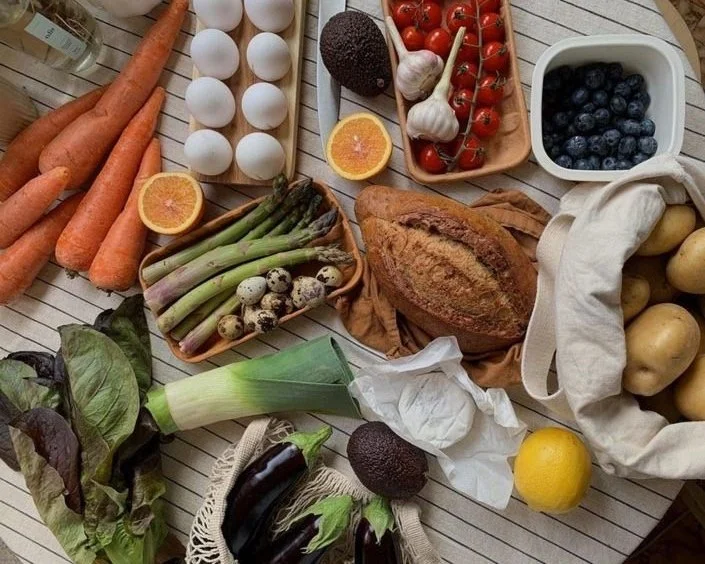5 ways to look after your gut health this Spring
Gut health is crucial to your overall health and wellbeing because the gut plays a huge role in the majority of our bodily functions
We know that around 80% of our immune system is housed in the gut meaning it plays a key part in how our immune system functions, but did you also know that:
— it affects our mood and mental health
— it is in constant communication with our brain and nervous system
— it manages inflammation in the body, including when it comes to our skin
— certain gut bugs have a role to play in the types of foods we crave
— all the nutrients, vitamins and antioxidants we eat are absorbed in the gut
The gut microbiome (the trillions of bacteria, viruses and fungi that live in our gut) differs from person to person but it is also affected by so many factors ~ genetics, the environment, our lifestyle habits and the food we eat. Thankfully, there are a few ways that we can support the health of our gut microbiome by making a few tweaks to our food choices and how we eat ~ and what’s more, you will start to notice a difference in as little as 5 days!
One ~ eat the rainbow
One of the best ways to support your gut is through a variety of plant foods ~ the more diverse your microbiome, the better and this is achieved by feeding it a diverse range of foods
I recommend aiming for 30 different plant foods a week, but this is not as intimidating as it sounds ~ spices, herbs, nuts, seeds, legumes, grains, different varieties and colours of the same vegetable all count…purple and orange carrots for example count as 2 different plant points
So this week, why don’t you:
pick 3 new veggies, herbs, nuts or seeds that you haven’t had in a while
try a new type of herbal tea
rotate your spices ~ instead of cumin and oregano, try using paprika, turmeric, curry powder or saffron
pick different varieties of your go-to's... so, if you love your usual broccoli, go for tenderstem or purple sprouting instead
look for mixed bags of nuts and seeds, or pre-cooked mixed grains
and for easy meal ideas, think about trays of mixed roasted veg, soups, frittatas, and (protein-rich) smoothies to pack the extra points in!
Two ~ add more fibre (slowly)
Fibre stimulates the growth and diversity of good bacteria in the gut and so it is a great inclusion in your diet! There are two types: soluble and insoluble
— for soluble, think of oats, beans, peas, psyllium husk
— for insoluble, think of green veggies, root veggies, celery, nuts and seeds
Our gut bugs thrive on both so include a source of each in your meals. But be careful not to go from 0 to 10 when it comes to fibre ~ increase the amount you’re eating gradually and make sure you’re staying hydrated (more on that below)
Three ~ incorporate prebiotic and probiotic foods
Probiotics help to repopulate your gut microbiome with beneficial strains of bacteria, while prebiotics act as food for your microbiome and help your good bugs flourish ~ I always recommend taking a “food first” approach so looking to natural sources of these is key! Examples are:
— Probiotics: fermented foods like kefir, miso, sauerkraut and live yoghurt
— Prebiotics: jerusalem artichokes, onions, garlic, leeks, asparagus, flaxseed, cocoa, oats and apples
Four ~ stay hydrated
Hydration is important to keep things moving in the gut, particularly for the contraction and relaxation processes of digestion so try to hit that 2L goal each day (and if you filter your water, make sure you add electrolytes or a pinch of pink Himalayan salt to put the good things back in)
One thing to be wary of though is drinking water while eating ~ this dilutes the enzymes working in your stomach to digest your food so stick to small sips as needed, saving glasses of water for half an hour before or after your meal
Five ~ eat more mindfully
Have you ever noticed that you feel more bloated after eating a meal quickly or when you’re on the move? This is because eating quickly and unconsciously is bad news for the gut… it’s much better to take time over your food and chew it properly! Chewing is the first stage of the digestion process ~ our stomachs don’t have teeth and chewing not only prepares the food for digestion, but it also sends a signal to the brain that we’re eating to help us feel full at the end of the meal
So before eating, sit down, take a few deep breaths to calm your mind and try to keep your phone and laptops away to avoid distractions!
This article is for educational purposes only and the implementation of the theories and practices discussed is at the sole discretion of the individual. All advice given is not a substitute for medical advice, diagnosis, or treatment. If you have any concerns about your health, you should speak with your doctor or health physician

